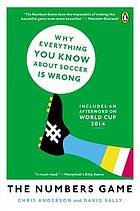
The Numbers Game
Why Everything You Know About Soccer Is Wrong
کتاب های مرتبط
- اطلاعات
- نقد و بررسی
- دیدگاه کاربران
نقد و بررسی

June 15, 2013
Using data to better understand (and improve a team's odds of winning) the Beautiful Game. Analytics, the use of data and statistics, has grown exponentially in the world of sports in recent years. Michael Lewis' Moneyball revealed how Oakland Athletics general manager Billy Beane utilized analytics to exploit inefficiencies in the baseball marketplace of players and ideas. Coaches and administrators, as well as fans of other sports, have increasingly tried to apply analytics to the games they love. Anderson (London School of Economics and Cornell Univ.) and Sally (Business/Dartmouth) fit well into that tradition in this fine book about the use of analytics in soccer. Like many within the growing number of books in this genre, the authors, both of whom are academics, former athletes and fans, have the ability to convey complicated ideas and even more complex data and statistics into a readable whole that will appeal to fans who want to better understand the most popular sport in the world. Whether they are trying to ascertain what percentage of possession determines victory, to decide whether it is best to focus on scoring goals or not conceding them, to establish just how much coaches matter to a team's success or myriad other exercises, they make compelling and occasionally contrarian cases for breaking away from thinking that too often comes down to, "seven words [that] have long dominated soccer: 'That's the way it's always been done.' " Anderson and Sally destroy most of the rationales for such thinking in this entertaining, witty and thoughtful book, which should appeal not just to soccer fans, but to readers of Malcolm Gladwell and Freakonomics. Even the most innumerate soccer fan will find in this book justification to add some math to make the world's game even more beautiful.
COPYRIGHT(2013) Kirkus Reviews, ALL RIGHTS RESERVED.

September 1, 2013
What Michael Lewis did for baseball with his now-classic 2003 book Moneyball: The Art of Winning an Unfair Game, Anderson (systems manager, London Sch. of Economics & Political Science) and Sally (business administration, Tuck Sch. of Business, Dartmouth Coll.) attempt in this lively study of the application of analytics in soccer--and they do it very well. Tracing the use of numbers, applied to soccer, the authors draw surprising and valid conclusions about the world's most popular game. The study of data in soccer--and in most sports--is a growing business, turning games of tradition into situational contests best managed by examining numbers to create a winning solution. For Anderson and Sally, soccer is not a game of possession but a game of managing turnovers. Their rather innovative and revolutionary way of looking at the game makes for fascinating reading at times amid a plethora of numbers and analysis. In the tradition of Simon Kuper and Stefan Szymanski's Soccernomics, Anderson and Sally contribute an admirable addition to the emerging literature of the business and analytics of sports. VERDICT Soccer enthusiasts and fans, sports historians, and even general readers will be captivated by this new and nontraditional account of the magical game.--Boyd Childress, formerly with Auburn Univ. Libs., AL
Copyright 2013 Library Journal, LLC Used with permission.

Starred review from June 1, 2013
It's a truism that soccer resists statistical analysis due to its free-flowing nature and few set plays. But times, and technology, are different, and now almost anything can be measured. To the recurring refrain of phrases such as Our data show, the authors subject the beautiful game to a gimlet-eyed accounting, determining which cherished beliefs are true and which are wishful thinking. And what do the data show? That luck plays more of a factor than most managers like to admitbut that managers are more important than many think. That regional differences in playing style are overstated. That weak players are actually more influential than talented stars. And that's just for starters. Coaches should read this closely, though it may prove dispiriting for fans. After all, arguing about ambiguities is half the fun. Occasionally, the authors get lost in the weeds (as in their close reading of what it means to possess the ball), but no matter. By any standard, this is a landmark book, scrupulously researched and bound to be influential. Although it's not light reading for casual fans, it may eventually change the game they watch. We compared Soccernomics (2009) to Moneyball (2003), but this hits even closer to the mark.(Reprinted with permission of Booklist, copyright 2013, American Library Association.)

























دیدگاه کاربران